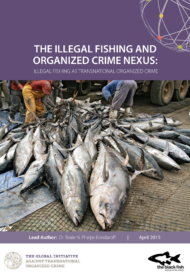Posted on 16 Apr 2015
More than 90% of the world’s fisheries are currently fully or over-exploited. A 2008 study estimated that the annual global illicit fishing catch was between 11 – 26 million tonnes, equal to more than 1,800 pounds of wild-caught fish stolen from the oceans every second.
Despite this, illicit fishing is treated predominantly as a regulatory issue, a matter of different actors violating regulations, perhaps opportunistically or out of ignorance. However, as this report, “The Illegal Fishing and Organized Crime Nexus,” commissioned jointly by the Global Initiative with The Black Fish, a Netherlands-based international organisation working to end illegal overfishing, now proves, illicit fishing practices are increasingly taking the form of a highly organized transnational crime.
Rather than fishers accidentally violating regulations, this evidence-based account documents systematic and highly coordinated efforts to violate fishing laws and regulations around the world, putting the stability of marine ecosystems in serious jeopardy. We see how illicit fishers enable their activities through the violation of labour and environmental standards, corruption, bribery and violence.
Case studies presented in the report also reveal an even darker side to illicit fishing – connected to human trafficking, illegal drug smuggling, serious violence and murder. It demonstrates the engagement of known mafia groups and criminal networks that profit from the practice.
Despite this evidence, illicit fishing continues to be treated as a regulatory issue instead of as a form of transnational crime, and as such this practice is able to flourish with minimal enforcement or penalties.
The report concludes that urgent and multilateral action is to be initiated to halt the growing multi-billion dollar illegal fish market. Recommendations advocate for the importance of urgently strengthening international regulations regarding shipping and vessels, creating domestic legislation designed to treat IUU fishing as a crime; dramatically increasing the punishments of offenders and significant enhancement of monitoring and enforcement are additional recommendations.




